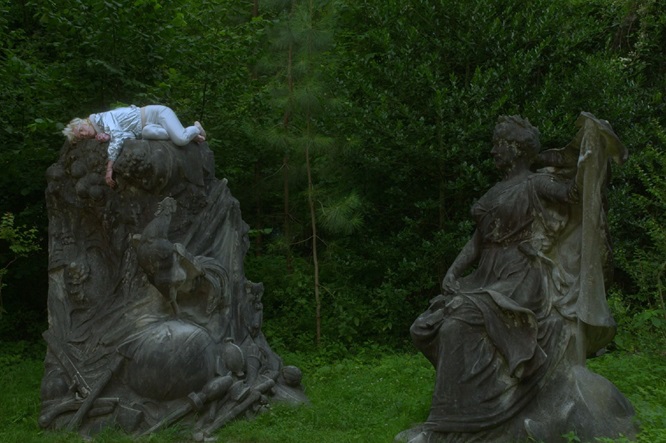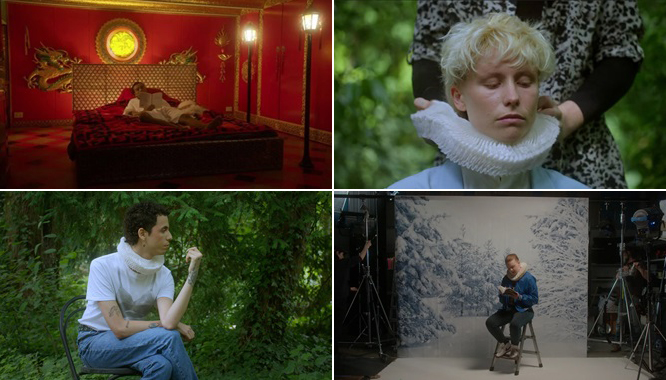
We are always at the crossing of paths. And it is from this crossroads that I address you, like the monster who has learned the language of humans.
The David Bowie of contemporary philosophy has delivered his first film. Paul B. Preciado, the shapeshifting art curator, columnist, and celebrated author of Testo Junkie: sex, drugs and biopolitics in the pharmacopornographic era has made a bold adaptation of Virginia Woolf’s popular gender-bender Orlando: A Biography. The book narrates the life of an English poet who falls asleep a man and wakes up a woman. She lives on for centuries, meeting eminent writers along the way.
I bring you the horizon.
The philosopher begins by taking the book personally, claiming the story as his own, his biography in fact. Though he soon delights in blowing up the book’s centre. While most biopics are quick to cut out a central figure, then reframe events inside it, Preciado conducted a casting call for Orlando and hired 26 people, an alphabet of Orlandos who appear in the movie, each announcing: “In this film, I’ll be Orlando by Virginia Woolf.” In place of the one, there are many. Part of their work is to remove the blind spots of class and colonialism that haunts Woolf’s story.
In Woolf’s account, gender migration occurs effortlessly while asleep, but now there is a choir of testimonies, as we hear about “the crossing” from a cast that includes both children and the elderly. These are bodies that have been hurt, stepped over, cast out, and also embraced and reinvented. They have changed the lives of those around them. One moving recount showcases the effects of the long-awaited drug testosterone, whose daily application slowly dissolves the hormones of one gender, though another has not yet appeared. This unsettled place between genders is returned to again and again. The point is not that gender is a problem that science has to solve, but that it offers a range of possibilities that Orlandos need to be allowed to live.
Heterosexuality is not just a politics of desire, it is a technology of government.
The movie extends an argument elaborated in Preciado’s books and lectures, that gender is one of the red threads that will lead us out of the labyrinth of capitalism. By understanding “male” and “female” as political fictions, it uses gender as a lens to clarify how “technologies of subjectivity… that modernity has invented to legitimize the sexo-colonial supremacy of the West over the rest of the planet are today in crisis.”
Canadian viewers might remember a federal justice minister named Pierre Trudeau who presided over the legalization of homosexuality, though not before stating that “there is no place for the State in the bedrooms of the nation.” Preciado argues that the State is always in the bedroom, that the roles couples are allowed to occupy, and particularly the need to control women’s bodies and reproduction, ensure that our most intimate acts and desires are politically motivated.
Love is not an emotion. It’s a kind of government technology of bodies, a politics to control desire, its goal is to capture the power to act and take pleasure from two living machines in order to put them at the service of social reproduction.

[Les Films du Poisson / 24 Images / Arte]
The movie is an animal with four spines. The first is Woolf’s Orlando, which is read aloud by a suite of bibliophiles. The second offers biographical sprinklings from Preciado’s life. The third looks at trans representations across the 20th century. And the fourth features autobiographical asides from the cast that lend the movie a rare and touching gravity. Each of these through lines is delivered in short missives, invariably intercut and interwoven, forming a series of duets, triads and quartets. It produces a thrilling demonstration that identity is always relational and in motion, wherever there is a subject, there is also a choir at work.
A thrift store elegance dresses up every character, though apparel is always a mismatched collage, contemporary t-shirts mix with elaborate jewelry and headdresses. Clothing is another skin, part of an ongoing experiment and embrace of the multiple. Unafraid to shift styles and blend genres, a doctor’s waiting room becomes a place where testosterone is easily exchanged, before the lights dim and the whole place explodes into a dance party. “You might be synthetic/but not apologetic/You’re not a doctor’s bitch.”
Masculinity is to society what the State is to the nation: the holder and legitimate user of violence.
There are two moments in the film that offer a post-humanist embrace. In the first, a suite of trees swaying in the wind offers the delicacy of hundreds of leaves lightly touching each other with the wind’s encouragement. In the second, a drop of rain becomes a trickle and then a sensual downpour. In each instance, the director upends traditional notions of what belongs to the background.
Fragility, and not courage, is what brings about revolution.
In the foreword to his 2019 book An Apartment on Uranus, Paul’s ex, Virginie Despentes, noted: “You write for a time that has not yet arrived. You write to children who have not yet been born, and who will also live in constant transition—which is the property of life.” In one of the most playful moments of the movie, kids take over a TV studio as the director’s voice says that he is “making this film for the Orlandos not yet born.” Preciado has written elsewhere of his parent’s disapproval of their wayward daughter, and how their fear and confusion led them to perform their expected roles. “What my father and mother were protecting was not my rights as a child, but sexual and gender norms that had been painfully placed in them.” This luxurious and courageous film, a collection of queer rituals and documentary testaments, offers urgently needed alternative histories, as its cast of trembling, vulnerable, sashaying, exuberant bodies find new languages for the politics of desire.
All quotes from An Apartment on Uranus by Paul B. Preciado (South Pasadena: Semiotexte, 2020).
*
Mike Hoolboom began making movies in 1980. Making as practice, a daily application. Ongoing remixology. Since 2000 there has been a steady drip of found footage bio docs. The animating question of community: how can I help you? Interviews with media artists for 3 decades. Monographs and books, written, edited, co-edited. Local ecologies. Volunteerism. Opening the door.
 |
envoyer par courriel | 
| imprimer | Tweet |
